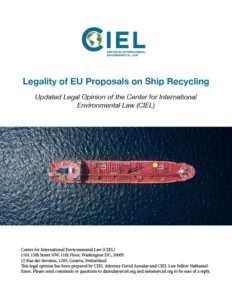
On November 20, 2013, the European Union adopted the Ship Recycling Regulation (SRR), which entered completely into force (as amended) in December 2018. The regulation was intended to integrate the provisions of the International Convention for the Safe and Environmentally Sound Recycling of Ships (the Hong Kong Convention) into the law of the European Union (EU). To that effect, the EU removed ships flying an EU member state flag from the scope of application of the Waste Shipment Regulation (WSR) that currently implements the Basel Convention on the Control of Transboundary Movements of Hazardous Wastes and Their Disposal (Basel Convention).
The SRR, among other things, creates a framework for exporting EU-flagged ships to facilities outside of the European Union or OECD, including facilities in developing countries, provided that these facilities are included on the European List of approved ship recycling facilities (“the European List”). Ship recycling facilities in India and China have applied to be listed as eligible facilities under the SRR, although none have been approved as of the time of writing.
Furthermore, there is reported interest among EU institutions and member states in concluding bilateral or multilateral agreements with developing countries where the majority of unsafe ship recycling currently occurs, such as India, Pakistan, and Bangladesh. Such agreements would allow for the export to these countries of ships at the end of their lives. It is understood that the states and institutions would argue that such agreements would fulfill the provisions of Article 11 of the Basel Convention.
The Center for International Environmental Law (CIEL) conducted a complete analysis of the legality of the Ship Recycling Regulation at the time of its drafting, in which CIEL concluded that the Regulation’s attempt to unilaterally exempt a certain category of hazardous waste covered by the Basel Convention, namely end-of-life ships, from the control mechanisms of the Convention is illegal under international and EU law. CIEL stands by that analysis today. Our previous argumentation has become even more conclusive now that the Basel Ban Amendment, which prohibits the export of hazardous waste from the EU and OECD to non-EU/OECD countries, entered into force on December 5, 2019. The present legal opinion will not repeat the points made in the 2012 legal opinion, with the hopes that the readers will avail themselves of that analysis.
Rather, this opinion focuses on two fundamental questions that have become even more important following the entry into force of the Ban Amendment:
- Would the inclusion of ship recycling facilities in developing countries on the European List under the SRR and the eventual export of EU-flagged ships to such shipyards be consistent with the obligations of the EU and its member states as Parties to the Basel Convention now that the Convention contains the Ban Amendment?
- Would the conclusion of a bilateral or multilateral agreement between the EU or its member states and developing countries that facilitates the export of end-of-life ships to those countries constitute a valid Article 11 agreement under the Basel Convention?
